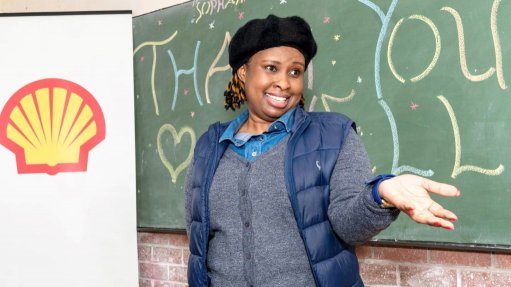
KEFILWE MASEKO For over ten years, the programme has given young individuals from disadvantaged or underprivileged backgrounds who have met the relevant academic requirements the opportunity to further their studies in tertiary institutions.
Commercial fuels, lubricants and oils retailer Shell Downstream South Africa has invested over R30-million in its science, technology, engineering and mathematics (STEM) bursary programme to help develop less fortunate youth in South Africa.
STEM subjects are more than gateways to “great, sustainable careers” – they dictate whether a country will be competitive and able to hold its own in a world where digitalisation and innovation are keys to future prosperity, says Shell Downstream South Africa learning and development manager Kefilwe Maseko.
“Increasing digitalisation and automation are changing the nature and mix of skills that young people will need to stay relevant in an ever-evolving world,” she comments, adding that the programme was established as a means of empowering students and resolving, at least in part, the issue of relevancy.
She enthuses that, for over ten years, the programme has given young individuals from disadvantaged or underprivileged backgrounds who have met the relevant academic requirements the opportunity to further their studies in tertiary institutions.
Applications for this year’s STEM bursary programme closed last month and Shell continues to directly inform the respective recipients.
To be eligible, applicants meet strict criteria such as being a South African citizen who has a matric certificate and having already registered for and been accepted to a local tertiary institution.
Additional criteria include having attained at least 70% in English, mathematics and physical science, depending on the field of study they have enrolled for; and the course of study being relevant to the energy sector.
Maseko stresses that the most important criterium is applicants’ coming froma disadvantaged or underprivileged background; the awarding of bursaries also consider the principles of diversity and inclusion.
“We have had a good success rate of bursars who have com- pleted the programme and entered the workplace success- fully.”
There are currently historic bursary programme recipients who are core to the industry and working in engineering departments, in addition to also providing support functions such as finance and marketing, she adds.
Added Advantages
In the past few years, Shell has awarded more than 200 bursaries, says Maseko.
“The programme not only provides financial assistance in terms of tuition fees, accommodation and the required equipment, including books, but also offers tutoring and counselling support, along with career-guidance workshops.”
Additionally, successful bursary recipients will have access to mentorship programmes, networking opportunities, and potential employment prospects within Shell's extensive network of partners and affiliates.
Bursars who become part of the programme are also afforded the opportunity to be hosted at a Shell depot and office.
“This gives the bursars crucial hands-on experience at an experiential learning day,
where they are given the latitude to engage with various leaders who are in core
operations of the business and in the office so that bursars can get a better
understanding of the practical side of what they are studying towards,” she explains.
Additionally, mentors are allocated to every bursar to lead discussions on various topics up to and including career guidance.
“We continue to demonstrate our commitment to driving positive change by enabling the youth to access the opportunity of education and, in doing so, fostering a more inclusive society,” Maseko concludes.